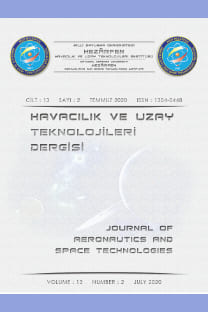İnsansız hava araçları için üs konumlarının kapsama alanı problemi olarak modellenmesi ve eniyilenmesi
Bu çalışmada, İHA’lar için en iyi üs konumlarının belirlenmesi Tesis Yeri Seçimi Problemi olarak modellenmiştir. Hedeflerin her biri için ayrı bir öncelik veya önem katsayısı söz konusudur. Diğer yandan, bütün aday üs noktaları maliyet, coğrafya, lojistik ve hava durumundan kaynaklanan ilave kısıtlara sahiptir. Ayrıca İHA’lar farklı tipte olup, hepsinin menzili ve maliyeti birbirinden farklıdır. En uygun üs yerlerinin belirlenmesi ve bu üs yerlerine uygun konfigürasyondaki İHA’ların atanması matematiksel olarak modellenip eniyilenmiştir. Bu amacı gerçekleştirirken, İHA’ların atandıkları üslerdeki kapsama alanı en büyüklenmeye çalışılmıştır. Geliştirilen 0-1 Tamsayı Programlama Modeli GAMS ile çözülmüştür.
Modeling and optimizing the bases of unmanned aerial vehicles as a set-coverage problem
In this study, the problem of finding the optimal placement for UAV bases is modeled as a Facility Location Problem. Every targets have their own priority or importance level. On the other hand every candidate point has additional constraints due to cost, geography, logistics and weather. Furthermore UAVs are heterogeneous so the range of each UAVs and it’s cost is different from each other. The problem of finding the optimum UAVs’ base locations and assignments of UAVs to each bases is optimized by formulating as 0-1 Binary Integer Programming(BIP) model. The main objective of the problem is the coverage of UAVs’ base locations are maximized. The proposed mathematical model is coded and solved with GAMS optimization software.
___
- [1] Drezner Z. and Hamacher W.H. 2002. Facility Location: Application and Theory, Springer.
- [2] Fredrich C.F. and Weber A. 1957. Alfred Weber’s Theory of the Location of Industries, Chicago Press.
- [3] Daskin M.S. 1979. A Maximum Expected Coverage Location Model: Formulation, Properties and Heuristic Solution, Transportation Science, Volume 17, pp. 48-70.
- [4] Dawson C.M. 2005. Minimizing Security Forces Response Times Through the Use of Facility Location Methodologies, AFIT MS Thesis, Wright- Patterson Air Force Base, Ohio.
- [5] Hakimi S.L. 1964. Optimum Locations of Switching Centers and Absolute Centers and Medians of Graph, Operations Research, Volume 12, pp.450- 459.
- [6] Kara Y.B. 2007. Network Hub Location Problems: The State of Art, European Journal of Operational Reseach, Volume 190, pp. 1-21.
- [7] O'Kelly M.E. 1992. Hub Facility Location with Fixed Costs, Papers in Regional Science, Volume 3, pp. 293-306.
- [8] O'Kelly M.E. 1987. A Quadratic Integer Program for the Location of Interacting Hub Facilities, European Journal of Operational Research. Volume 32, pp. 393-404.
- [9] Brandeau M. and Chiu S. 1989. An Owerview of Representative Problems in Location Research, Management Science, Volume 35, pp. 645-674.
- [10] Daskin M.S. and Latoya K.D. 2004. Location of Health Care Facilities, Operation Research in Health Care, Volume 1, pp. 43-76.
- [11] Revelle C.S. and Hogan K. 1989. The Maximum Availability Location Problem, Transportation Science, Volume 23, pp. 192-200.
- [12] Klamroth K. and Hamacker W.H. 1996. Planar Location Problems with Barriers Under Polyhedral Gauges, Kaiserslauten University.
- [13] Church R.L. and ReVelle C.S. 1974. The Maximal Covering Location, Papers of the Regional Science Association, Volume 32, pp. 101-118.
- [14] Başdemir M. 2000. Locating Search and Rescue Stations in the Aegean and the Western Mediterranean Part of Turkey, AFIT MS Thesis, Wright-Patterson Air Force Base, Ohio.
- [15] Laporte G., Gendreau M. and Semet F. 2003. The Maximal Expected Coverage Relocation Problem for Emergency Vehicles, Journal of Operational Society, Volume 57, pp. 22-28.
- [16] www.earthgoogle.com (Erişim Tarihi:10 Nisan 2009).
- [17] www.movable-type.co.uk/scripts/latlong.html (Erişim Tarihi:10 Nisan 2009).
- [18] Schilling D., Jayarman V. and Barkhi R. 1993. A Review of Covering Problems in Facility, Location Science, Volume 1, pp. 23-55.
- [19] Marianov V. and Serra D. 1998. Probablistic Maximal Covering Location-Allocation Models for Congested Systems, Journal of Regional Science, Volume 38, pp. 401-424.
- [20] Overholts L.D. , Bell J.B. and Arostegui M.A. 2008. A Location Analysis Approach for Military Maintenance Scheduling with Geographically Dispersed Service Areas, Omega, Volume 37, pp. 838–852.
- [21] Shetty V.K., Moises S. and Nagi R. 2008. Priority-based Assignment and Routing of a Fleet of Unmanned Combat Aerial Vehicles, Computers & Operations Research, Volume 35, pp. 1813-1828.
- [22] Winston W.L. 1993. Operations Research Applications and Algorithms, 3rd Edition, Duxburry Press.
- [23] Aksen D. 1998. Teach Yourself GAMS, Boğaziçi Üniversitesi Yayını, İstanbul.
- [24] Rosenthal R.E. 2008. GAMS – A User’s Guide, Gams Development Cooperation, Washington, USA.
- [25] McCarl B.A. 2008. McCarl Gams User Guide, Gams Development Cooperation, Washington, USA.
- [26] O’Kelly M.E. 1992. Hub Facility Location with Fixed Costs, Papers in Regional Science, Volume 71, pp. 293-306.
- [27] Merrill D.L. 1989. Facility Location and Routing to Minimize the Enroute Distance of Flight Inspection Missions, AFIT MS Thesis, Wright- Patterson Air Force Base, Ohio.
- [28] Berman O. and Krass D. 2002. The Generalized Maximal Covering Location Problem, Computers Operations Research, Volume 29, pp. 563– 581.
- [29] Cooper J. 1990. Logistics and Distribution Planning, Kogan Page Ltd.
- [30] Chan Y. 2001. Location, Transportation and Land Use, Modelling Spatial-Temporal Information, Springer.
- [31] Klamroth K. 2002. Single Facility Location Problems with Barriers, Springer Series in Operation Research and Financial Engineering.
- [32] Daskin M.S. 1995. Network and Discrete Location: Models, Algorithms and Applications, New York: John Wiley & Sons, Inc.
- [33] Fuller D.E. 1997. Optimizing Airborne Area Surveillance Asset Placement, AFIT MS Thesis, Wright-Patterson Air Force Base, Ohio.
- ISSN: 1304-0448
- Yayın Aralığı: Yılda 2 Sayı
- Başlangıç: 2003
- Yayıncı: Dr. Öğr. Üyesi Fatma Kutlu Gündoğdu
Sayıdaki Diğer Makaleler
Görev analizi sonucu bir savaş uçağının motor itki gereksiniminin belirlenmesi
Bütünleşik ANP-VIKOR yaklaşımı ile ERP yazılımı seçimi
Genetik algoritmaların kullanımıyla küme bölme modelinin çözülmesi: ekip eşleştirme uygulaması
Concurrent aircraft routing and maintenance scheduling
İLKAY ORHAN, MUZAFFER KAPANOĞLU, T.Hikmet KARAKOÇ
ÖNDER ALTUNTAŞ, TAHİR HİKMET KARAKOÇ
Doğrusal olmayan optimizasyon problemleri için taşınır algoritmik fonksiyonlar yöntemi
Radyo frekansı ile tanımlama sistemi seçiminde analitik hiyerarşi prosesi uygulaması
